Jumping rope. It’s not just for kids anymore.
In fact, if the 40+ Double Dutch Club’s phenomenal growth is any indication, the former staple of childhood games might now belong to adults.
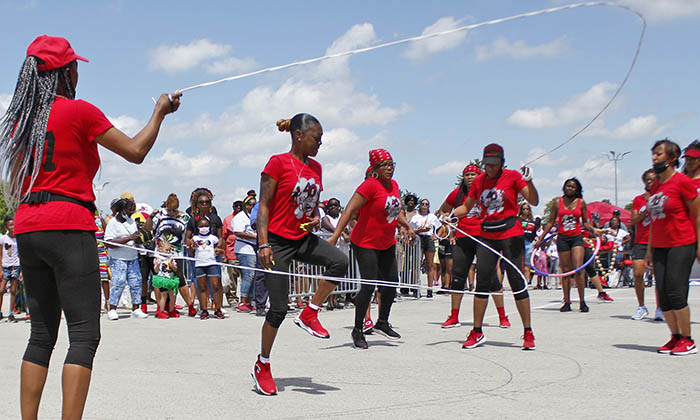
Local members of the club were featured performers at the Homewood-Flossmoor community’s first Juneteenth celebration in 2021, putting on a vigorous display of rope jumping skill.
In spite of the hot sun, they took turns leaping into the middle of twin spinning ropes moving in opposite directions, found the rhythm and jumped in. They jumped fast. They kept jumping.
It was a workout — and it was the group’s third appearance of the day.
As the name implied, all the women jumping were 40 years old or older. The oldest that day, Phyllis Pelt, was 75.
When they jump, the years seem to disappear.
The beginning
The 40+ Double Dutch Club began five years ago with a meetup at the Homewood-Flossmoor High School parking lot. Today, it’s an international movement.
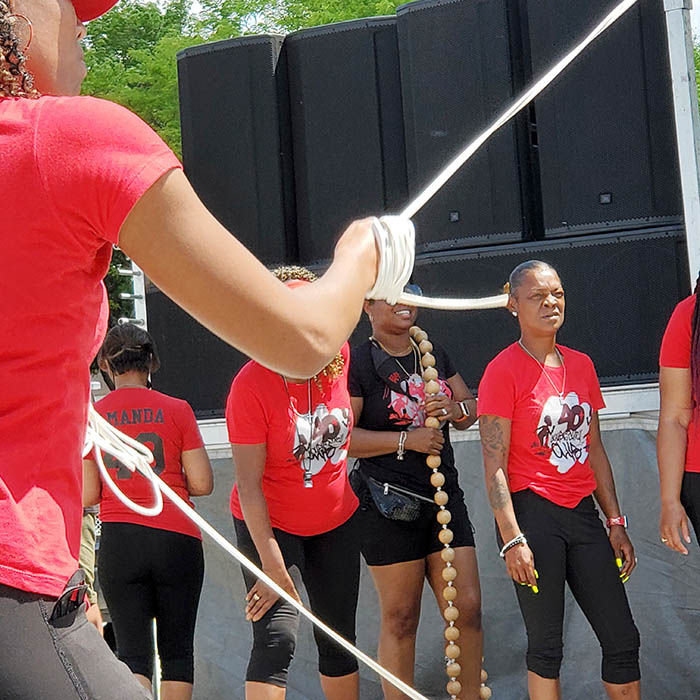
The founder, Pamela Pelt-Robinson, believes God’s hand guided the journey from a dozen women meeting to jump rope in a parking lot to an organization with more than 17,000 members in three countries on two continents that continues to grow.
In this case, God’s hand took shape as emotional pain, some inert kids focused on their phones, an offhand remark and a supportive friend.
Robinson said she was going through a very difficult time in her life. Her children were grown. Her marriage had ended. She described herself as at a crossroad, unsure which way to turn.
On Memorial Day in 2016 she went to a barbecue at a friend’s home. That’s where the idea was born that would eventually become the double dutch club.
The weather was fine, but the kids were all focused on their phones, just sitting. The adults noted how different things were when they were young.
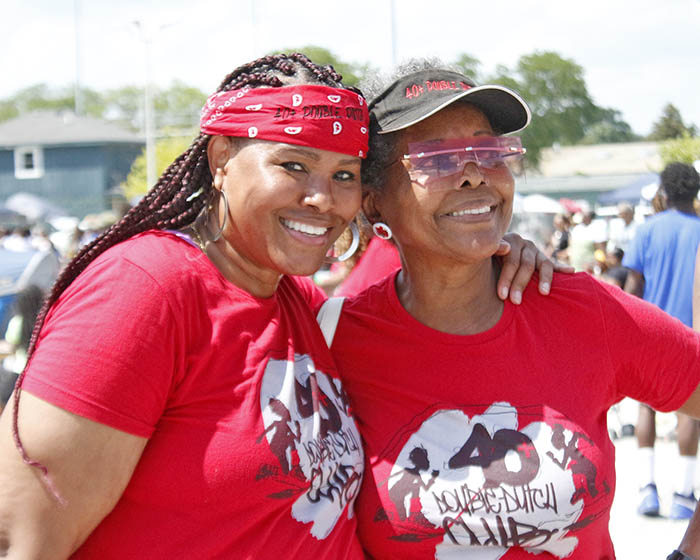
“We were just talking about how back in the day we would’ve been outside playing, enjoying the sunshine and boys would’ve been playing basketball. Girls would’ve been jumping double dutch,” she said. “And one of the ladies said, ‘If we had a double dutch rope right now, we could really show those kids to show these kids.”
As it happened, Robinson had ropes in her car. The game was on.
“During the 30 minutes that we jumped, um, it took my mind off of everything that I was going through,” she said.
She had so much fun that later she consulted with her friend and co-founder Catrina Dyer-Taylor and suggested they try a double dutch meetup. They decided to put out the call to see if anyone else was interested.
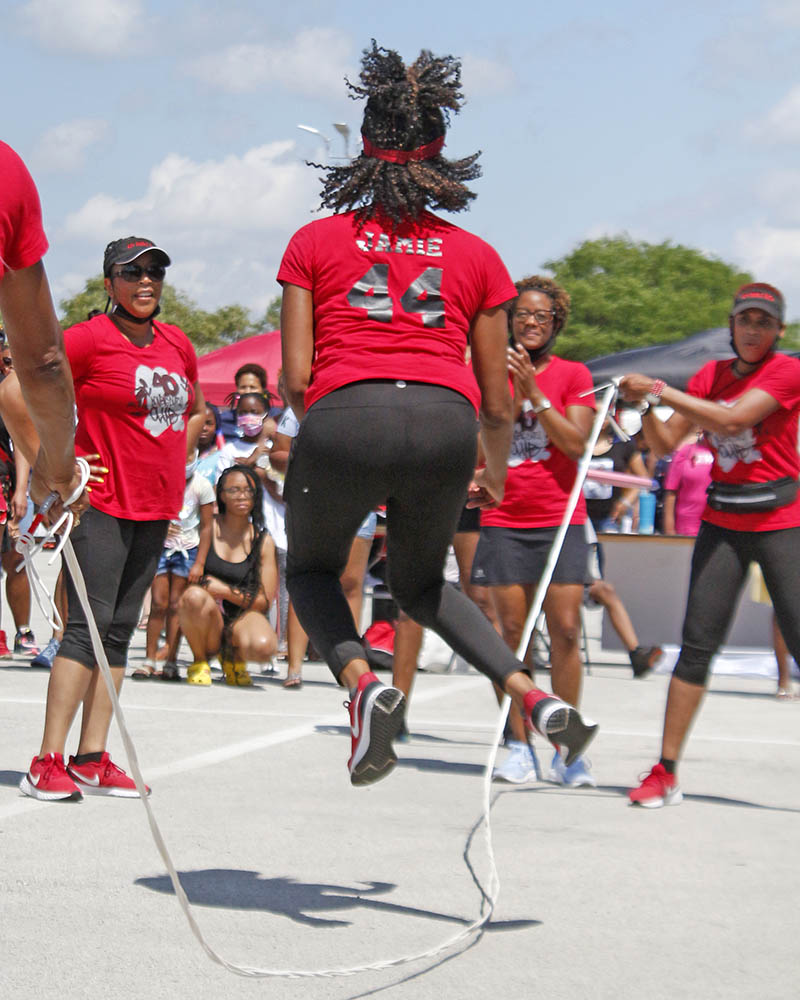
Robinson thought it might be play therapy, a way to get through the hard times she was experiencing.
“And, at least at the very least, it’ll give me something to smile about,” she said.
The first meetup was held in the parking lot of Homewood-Flossmoor High School, and the Facebook call out attracted a small group of women who also had fond memories of playing double dutch as girls.
What is double dutch?
The game of jumping ropes or vines may have started, variously, in Egypt, Phoenicia or China. Most sources online indicate the game was brought to the Americas in the 1600s by Dutch settlers, thus the name the game is known by here.
It grew in popularity during the mid-20th century, especially in urban African American communities.
Phyllis Pelt, Robinson’s mother, said she taught her kids the game, which she remembered playing as a child. in the past, the game was most popular in relatively poor neighborhoods where few recreational opportunities were available for kids.
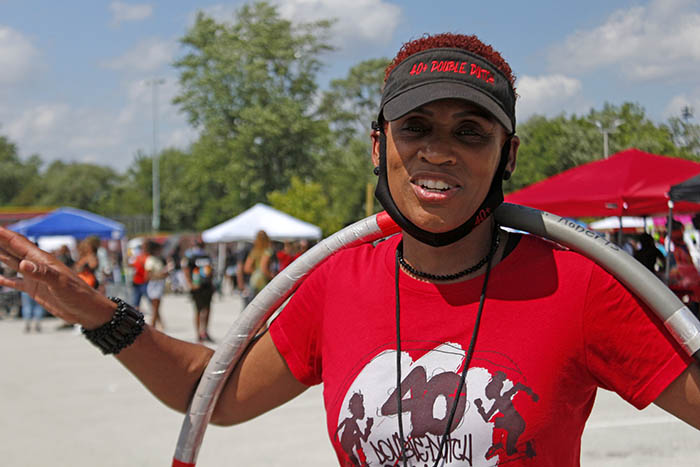
And in places where people often couldn’t afford clothes dryers, “anybody could get a clothes line,” she said. “In the inner city it’s a cheap way to entertaining yourself and it’s exercise. We weren’t thinking of it as exercise. we were just thinking of it as playing outside.”
Histories commonly note that a Harlem police officer was impressed by the skillful footwork and energy of kids playing double dutch and in 1973 developed rules for a competitive game.
The childhood bubble
Competition is not the point for the members of the 40+ Double Dutch Club.
Leslie James, one of the original members and an ambassador for the club, said after the Juneteenth performance that the purpose is to temporarily leave adulting behind.
In addition to double dutch, the group does hula hooping, African hopscotch, original hopscotch and Chinese jump rope, she said.
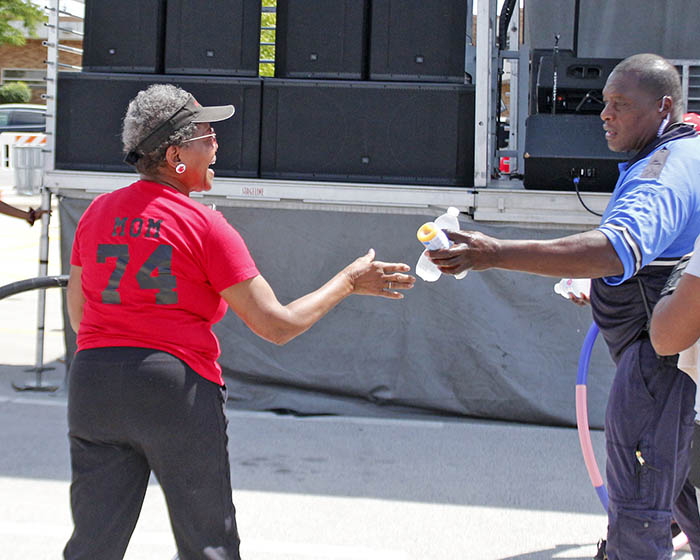
“This is an escape for us. No men, no kids, no dogs,” she said. “It’s more than just jumping. It’s more about friendship, sisterhood.”
That’s among the reasons for the age limit on membership. Robinson said women 40 and older are more likely to have fond memories of the game, and that shared feeling is one of the ties that form the sisterhood.
It’s more than just childhood jumping, though. Women who didn’t jump as kids are still welcome and members are glad to teach them the ropes, literally. Being at similar stages of life is also important because it provides common experiences and needs that women can share, she said.
Anita Hines said she joined the County Club Hills subclub in 2017 when she learned about it from a coworker.
“I have been jumping since I was a kid. That’s what we did for fun,” she said. “I was 54 years old and wanted the exercise and cameraderie that came with being in the club. I loved it. We would hula hoop, play Chinese jump rope, as we call it and other childhood games. Being in the club removed the stress from a day’s work. I even ran into an old coworker from the ’80s.”
Robinson said that’s a common story. Women in the club’s age range tend to spend a lot of time tending and worrying about husbands, kids, grandkids and parents. A lot of people need them, and they need a break occasionally.
Fun for fitness
When jumping as kids, exercise was incidental.
“We were exercising every day and didn’t even know it,” Robinson said. “We thought we were just having fun.”
Now, the fitness is more intentional. Of course, the women recognize that the games might conjure up feelings of nostalgia, but they are playing with older bodies. They take that into account.
“We start off with 10 minutes of stretching,” James said. “We don’t want anyone to hurt themselves. One of our mottos is ‘listen to your body.’”
The club is very accessible, too. Local member Stephanie Roberts said there are no fees or dues. The only requirement is that all members buy a club T-shirt with the club logo and their age displayed.
Turning point
The early group who gathered in 2016 soon became a club, and the club continued to grow over the next couple of years.
Robinson said in addition to H-F High, the club was meeting regularly at Trinity United Church of Christ on 95th Street in Chicago. The club got noticed by ABC TV, and members were invited to appear on “Windy City Live” in 2019.
The media attention changed the club’s fortunes, and quickly.
“We went from about 50 local Chicagoland women to over a thousand women across the nation in less than a week,” Robinson said.
She and Dyer-Taylor had to quickly adapt to the rapid growth. They wanted to make sure the experience would be consistent for everyone so it would have the kind of value they found in it. They started thinking of it as a real organization rather than an informal diversion.
As people in other places expressed interest, they were invited to form subclubs. The local leaders have regular calls with captains of subclubs, initially to help them learn how to run meetups and to convey the vision of the club.
“There’s a format to every meetup. Want them to get the same things that they saw on the videos, that same feeling of being a kid again. We want everybody to be able to experience that.”
The formula seems to be working. The club continues to grow and now includes about 18,000 members in 100 cities across the country. There are subclubs in Canada and Israel, and new ones forming in Germany and Ghana.
There are more than 31,000 members of the club’s Facebook group.
As that growth indicates, the childhood games the club plays are filling a need for more than just exercise.
Robinson said she’s heard from numerous women about how healing and life-restoring the club has been for them.
“There’s so many women who say this movement has saved my life,” Robinson said.
She told about one woman whose husband died unexpectedly late in 2018 and was struggling to cope with the loss. She saw jumpers on the “Windy City Live” program and decided to join.
“She said it just showed her that there’s still joy to be had, and once she joined the double dutch club that gave her a whole new lease on life,” Robinson said. “And people think all we’re doing is jumping double dutch.”
Resilience
The club members have not let the pandemic stop them. Rather than pausing the meetups, they adapted. Sometimes they would meet virtually. Sometimes they would bundle up and jump outside, even in winter.
Pelt, who is a retired public nurse, said when they did indoor meetups, they observed strict pandemic safety protocols, including temperature checks, masking, social distancing and vaccine checks.
Robinson said with the Omicron surge this winter, she was exploring the possibility of administering rapid result tests at meetups to ensure the safety of everyone.
Capturing the magic
After more than five years of enriching so many lives, Robinson’s family decided it was time to chronicle the adventure in film and book form.
Robinson’s son, Julian, is an H-F graduate and now a film student at Arizona State University. He is working on a documentary about the club.
The club is accepting donations to help support film production.
Pelt is collecting testimonials from women in the club and hopes to publish them as a book.
Both the book and film will help spread the word about the magic of play. Robinson also hopes that even though younger women are not allowed in the club, they will get a positive message from learning about it.
“We also want to set a good example for the younger women so that they can see getting older isn’t something to be afraid of,” she said. “This can be a good thing.”

